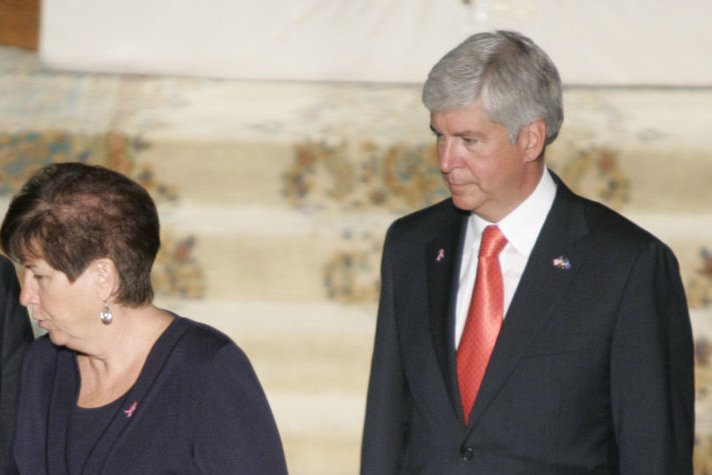Michigan Gov. Rick Snyder source of Sierra Club frustration after state suspends some climate efforts in the wake of last week's Supreme Court ruling. Photo by Rex Larsen/POOL/UPI |
License Photo
LANSING, Mich., Feb. 17 (UPI) -- With a Supreme Court vacancy hanging over federal energy plans, the Michigan chapter of the Sierra Club cried foul after the state raised low-carbon questions.
The nation's highest court last week granted a stay of the so-called Clean Power Plan pending a review in the United States Court of Appeals for the District of Columbia Circuit. Michigan, one of a handful of states questioning the plan, said it decided to suspend efforts to comply with the rule while it waits for a resolution in the lower courts.
Mike Berkowitz, the legislative director for the Michigan chapter of the Sierra Club, said Michigan Gov. Rick Snyder, already on the environmental hot seat for Flint's drinking water contamination, is showing a lack of commitment to climate policies.
"His decision to pull the plug on a common-sense plan to reduce carbon pollution in Michigan is shameful and is just another example of his failure to lead and protect Michigan's families and natural resources," he said in a statement.
The final version of the Clean Power Plan, unveiled in late 2015, set a goal of cutting emissions of carbon dioxide, a potent greenhouse gas, by 32 percent of their 2005 baseline by 2030. In March, Snyder said the state was moving forward on its own as coal fades from the state power sector. Michigan, he said, is one of the 10 states most dependent on coal.
"Our state can reach a goal of 30 to 40 percent renewables plus waste reduction within a decade," he said last year.
The Supreme Court's ruling was split 5-4, with Justices Stephen Breyer, Ruth Bader Ginsberg, Elena Kagan and Sonia Sotomayor moving against the application for the stay. The ruling came before Justice Antonin Scalia died at a ranch in Texas, putting the short-term future the high court in question amid a heated U.S. presidential race.
In nearby Minnesota, Gov. Mark Dayton said last week he was disappointed by the Supreme Court's temporary stay, adding it would do "nothing to diminish our resolve in Minnesota to keep moving forward on clean energy initiatives."















